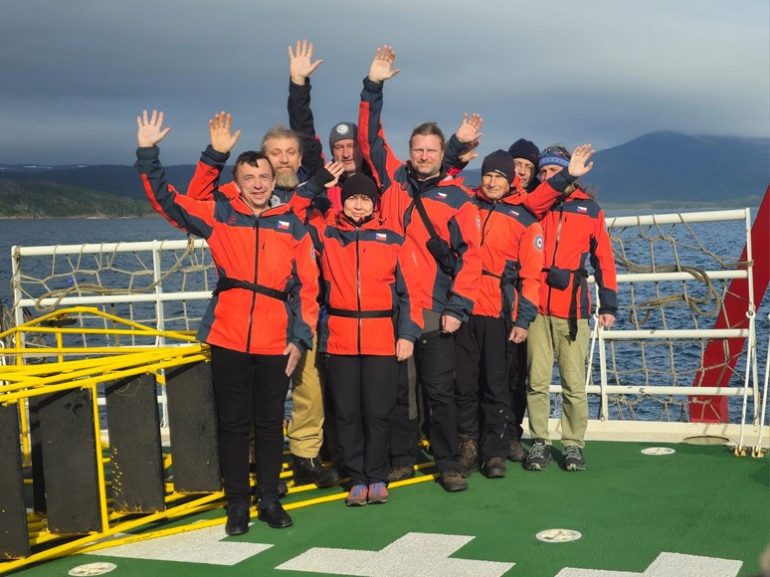A total of 24 participants will take part in this year’s 20th Masaryk University (MU) expedition to Antarctica. The main part of the expedition (16 people) will arrive at the JG Mendel Czech Science Station on James Ross Island on Wednesday, 24 January, and will spend about two months there. During the stay, in addition to research activities, they will test new devices, instruments and equipment, and also film a documentary about Czech Antarctic research for Czech Television.
The first eight members of the expedition left the Czech Republic on 27 December and arrived safely at the CZ*ECO Nelson base in the first week of January. This smaller expedition will last six weeks, of which almost four weeks will be spent working on King George Island and Nelson Island. After that, two of the participants of this group will go to the Ukrainian Vernadsky station on Galindez Island, where they will continue to work on joint Czech-Ukrainian research, and will return to Europe only at the beginning of May.
The main group is travelling from Vienna airport via Madrid to Chile, before being transported by the Chilean Navy ship Sargento Aldea across the Drake Passage to Antarctica, and on board the ship Janequeo to the JG Mendel Station on James Ross Island. This part of the expedition consists of nine scientists (one of them from Charles University), a doctor, four technicians and two documentary film-makers: traveller and documentary filmmaker Petr Horký, an experienced polar explorer who has visited three of the Earth’s poles, and cameraman Jan Šimánek. Together they will produce a documentary on the Czech Antarctic Research Program for Czech Television.
“It’s a tremendous opportunity to show the general public where our program has moved in 20 years of its existence, in addition to the most attractive possible form of a professional film documentary shot by the most professional filmmakers,” said the head of the Czech Antarctic Research Program Daniel Nývlt, from the Institute of Geography of the MU Faculty of Science.
The scientific goal of the expedition this year is primarily long-term climate monitoring and comprehensive monitoring of the state of polar geo- and ecosystems, including local glaciers, long-term frozen soil, deglaciated territory allowing the growth of lower plants, river and lake systems and other geomorphological formations.
“The five-year Junior Star project will continue, focused on the study of changes in long-term frozen soil in the area of the Antarctic Peninsula, as well as medical research on the effect of stress on the health of workers in polar regions, which is being carried out in cooperation with the Ostrava Faculty Hospital and at the same time with the MUNI Faculty of Sports Studies and the Czech Academy of Sciences,” said expedition leader Peter Váczi, from the Institute of Geography and the Institute of Experimental Biology of the MU Faculty of Science.
Scientists from the Institute of Anthropology will also monitor changes in the bodies of expedition participants during the trip, as part of the ADAPT project. Anthropologists have recorded information on the body dimensions of the expedition members before departure, and will make comparisons upon arrival. The obtained data can be used, among other things, to optimise the equipment and clothing tested in Antarctica.
“The foreign participants in our international expedition will be two Slovak colleagues who are graduates and employees of MUNI, as well as two scientists from Ukraine,” said Pavel Kapler, manager of the Czech Antarctic Research Program, which is based at the Institute of Geography of the MU Faculty of Science.
The expedition may encounter some complications during its stay. “According to reports from the Council of Managers of Antarctic National Programs (COMNAP), the highly pathogenic avian influenza virus (HPAI) is heading into the area, which will limit some of our planned activities and completely prevent the possibility of conducting animal research,” added Kapler.





